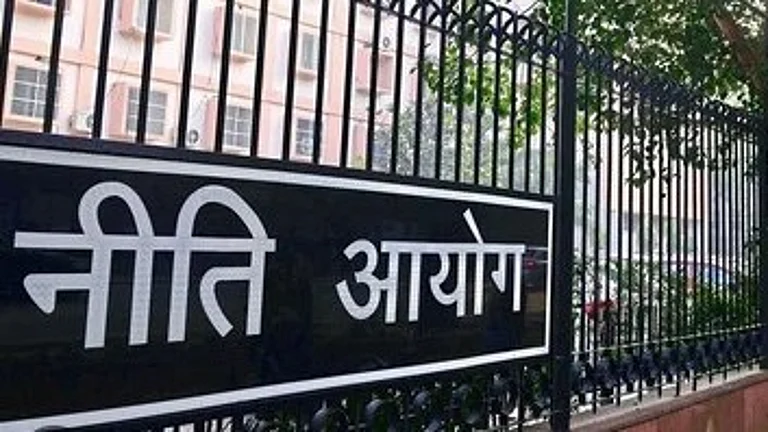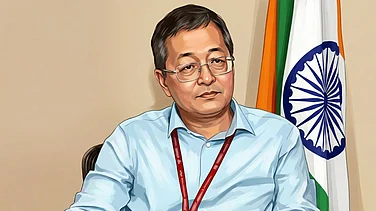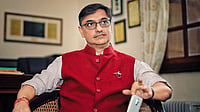Four days before he passed away, prominent economist Bibek Debroy wrote in his last column sent to The Indian Express, “There is a world outside that exists. What if I am not there? What indeed?” Indeed, this rumination on the ‘world outside’ is not unusual for a scholar who also worked extensively with classical texts and scriptures. “So am I, transient and puerile, a dot that might have been wiped off. In that event, what would have happened?” he questions in the letter.
Debroy passed away on Friday, November 1, at the All India Institute of Medical Sciences in New Delhi. He was 69. Despite his worries of transience, his contributions were manifold. He played a crucial role in shaping economic policies, the Niti Aayog—of which he was a member since its inception in 2015 to 2019—and finally, his contributions to translating Sanskrit texts. His rendition of the Mahabharata in ten volumes and his three-volume Valmiki Ramayana are among his most well-known. In fact, his translation of the Mahabharata exemplified not only his linguistic mastery but also the breadth of his intellectual pursuits.
Shaping the Indian Economy
Born in Shillong, Debroy studied at Ramakrishna Mission School, the Delhi School of Economics and later, at Trinity College, Cambridge. His reputation as an intellectual and scholar was built during his time at the Gokhale Institute of Politics and Economics and the National Council of Applied Economic Research.
He was appointed permanent member of the Niti Ayog soon after it was established in January 2015. During his tenure that lasted till 2019, he was appointed chairman of the economic advisory council to the Prime Minister in September 2017. He also chaired the finance ministry’s expert committee for infrastructure classification and financing framework for Amrit Kaal that aimed at making policy changes to drive economic growth over the next 25 years.
As a Niti Aayog member, he garnered attention when he proposed taxing agricultural income above a certain threshold to expand the tax base, alarming some sections in the country, as well as the government. “The threshold for taxing rural agricultural income should be the same as urban income. However, rural agricultural income taxed could be an average of three years as it is subject to weather fluctuations,” Debroy said in 2017, following a Niti Aayog proposal suggested to expand the tax base.
He would come to be known for his arguments in making amendments to existing agricultural tax laws and was vocal about his opinion that tax laws for farmers and the agricultural sector were “unjust”.
But his lighter side was also on view at times. When the government announced the demonetisation of Rs 500 and Rs 1,000 currency notes in November 2016, the development economist Jean Drèze said, “Demonetisation in a booming economy is like shooting at the tires of a racing car”. When asked to comment on the statement at an interview, Debroy replied, “This is the first time Jean Drèze has accepted that it [Indian economy] as a booming economy and compared it with a booming car.”
The Economist Next Door
Whether it was economics, policy or mythology, Debroy’s mastery of a subject was evident in the depth of his answers and his desire to make young people aware of the intricacies of economic policy and tax laws.
In an interview to Outlook Business during the 2024 Lok Sabha elections, Debroy showed no hurry or discomfort when asked about the underperformance of the Indian economy in certain sectors. Instead, he used the opportunity to clarify earlier comments by a fellow economic advisor and took out time to sketch diagrams on a piece of paper, smiling, as he explained the workings of the economy.
It was this deep love for detail that allowed him to share the benefits of his wisdom with not only policymakers but also the common man. In 2015, he was awarded the Padma Shri, to celebrate his contributions to literature and education.
The Pursuit of Mythology
Debroy’s passion for mythology was kindled by the Marxist economist Ashok Rudra, who was a faculty at Visva Bharati University when Debroy was teaching at Presidency University, Kolkata. Despite being friends, both had polar ideologies when it came to free markets, leading Debroy to opt for “tacit consent” to not discuss economics. “So, we discussed the Ramayana, the Mahabharata and things like that,” he said in an interview.
Hoping to kindle an interest in mythology, particularly among the youth, Debroy hosted a show, Itihasa, on Sansad TV, the official channel of the Parliament. The series was a journey to discover what “Bharata” is, what it means to be bharatiya and their position in sanatana sanskriti.
Debroy became the second person to translate both the Mahabharata and the Ramayana in their unabridged forms into English. He translated the unabridged version of the Mahabharata into English, in a series of 10 volumes. He also translated the Bhagavad Gita, the Harivamsa, the Vedas and Valmiki's Ramayana, making esoteric Hindu scriptures accessible to first-time readers.
































